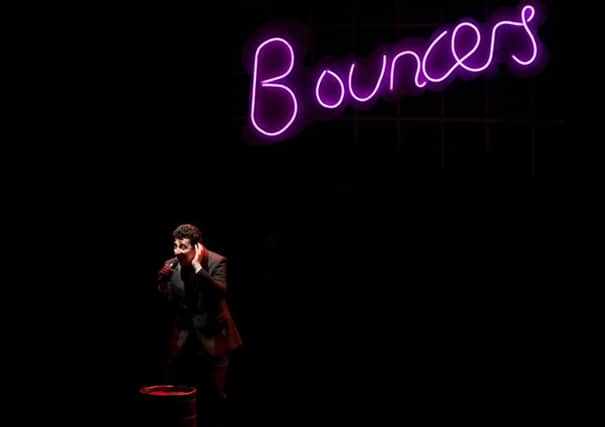The enduring appeal of a modern comedy classic


In 1977 a mountain of a man climbed into a cramped car, drove to Edinburgh and into the history books.
John Godber, Bretton Hall graduate, son of a miner, with a doctorate in Brechtian theatre, had the set for Bouncers in the back of his car.
Advertisement
Hide AdAdvertisement
Hide AdBack then, Bouncers was a two-hander – and one of the most memorable performances at the Edinburgh Festival, Godber has told me, was when an audience of two included a drunk who at one point got up on stage.
At the risk of sounding solipsistic, 1977 was also the year I was born. The relevance? The odds were seriously stacked against me ever seeing a show that shares the year of my birth and that went through a labour at an arts festival that was, even then, a bit of a bunfight at which to get noticed.
Here it is, however, almost 38 years on (we both reach that age in August – Bouncers two weeks before me) and the truth is Godber’s play is in a lot ruder health than I am. It was always going to live at least long enough for me to meet it.
I first encountered Bouncers at its spiritual home in 2005, a year after I became the Yorkshire Post’s theatre critic. I knew the play by reputation, but I was not prepared for what I actually encountered. It is a barnstorming gift to actors who get to rattle through around 50 characters during its couple of hours’ playing time. My first Bouncers cast was Rob Angell, Jack Brady, Dicken Ashworth, Matthew Booth – I can still picture that cast on that stage, turning the set into a sweaty nightclub with the deft motion of upturning a barrel.
Advertisement
Hide AdAdvertisement
Hide AdJack Brady as Plain Elaine (it’s such a shame) is still an image that raises a smile. Then there’s the unforgettable Lucky Eric’s speeches, including his powerful fourth and final speech in which he reveals that this funny, irreverent, slapstick-filled show is about the working class and the position it holds in contemporary society.
Lucky Eric’s monologues are where Godber rages against the machine that keeps the working class in their place with the promise of weekly intoxication, a temporary state of euphoria gained at the nightclub Mr Cinders.
When this rage is unleashed, in the context of a comedy featuring 20-stone blokes playing sexy young women struggling to stand up in high heels, the effect is like being kicked in the head by a ballerina mid-performance.
Incredibly, the righteous anger that fuels Bouncers hasn’t dulled over time. We live in a post-Chavs (the book by Owen Jones) world – Bouncers feels more relevant than ever.
Advertisement
Hide AdAdvertisement
Hide AdIn 2000, the National Theatre listed what it considered to be the most important plays of the past 100 years. Bouncers was on the list.
Six months after my first Bouncers in Hull Truck, I went to see it again, this time in Halifax at the Viaduct Theatre. In that musty, dank former underground car park of a theatre, the darkness of Bouncers was all enveloping and I realised the chameleonic character of Bouncers is one of its secret to longevity. It moulds itself to its environment – immediate and societal. It will always have something to say.
Godber tells me that the latest version of Bouncers, which he is directing and opens at Wakefield Theatre Royal on January 27, will be the definitive version. I doubt it. There is something far too final, complete, about calling it that. I suspect there will be much more to come from this genuine contemporary classic.